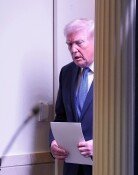[Editorial] Unreasonable Enforcement
[Editorial] Unreasonable Enforcement
Posted May. 30, 2006 03:08,
The government has announced that it will revise the enforcement decree on housing to require those who buy houses in specifically designated areas to report not only the real purchase price but also the financing plan and whether the owner will live in it from this coming July. They should submit their deposited amount in financial institutions, the amount of the house sales, sales of stocks and bonds, cash, and borrowed money from financial institutions and private lenders. This means that the inspection on financial resources to which tax dodgers and speculators are subject will be expanded to average citizens who buy homes in the specified areas.
Currently, the zones include Gangnam-gu, Seocho-gu, Songpa-gu, Yongsan-gu, Yangcheon-gu, Gangdong-gu, Yeongdeungpo-gu, Seongdong-gu, Dongjak-gu in Seoul, Ilsan in Goyang City, and Gwacheon, Yongin, Suwon, Gwangmyeong, Gunpo in the metropolitan area. Requiring property document of residents who own one house in the regions violates the privacy of the public and property rights. This is like searching shopping bags, wallets, and pockets of all customers and demanding shopping details on the information that a pickpocket is in the department store.
The Ministry of Construction and Transportation said, Since the National Tax Service will utilize the information, this measure will curb speculation. This is like saying that searching all customers in the department store will prevent pick pocketing.
The revised enforcement decree is focusing only on anti-speculation in the housing market and does not consider public inconveniences that the law entails. A feasible policy needs not only a justifiable goal but also proper means to deliver it. It should also balance the public interest it pursues and individual interest it violates.
If the law is implemented without a change, it will discourage sales of homes and, in effect, restrict the constitutional freedom of residence. This restriction will make it harder for individuals to do business activity, which may well disrupt the market principle of free transactions.
The recent government move is reckless in that it pushes for the regulation with an enforcement decree that has much potential to violate basic rights. A government that puts burden on the public and violates privacy with excessive regulation deserves being called a dictatorship.







